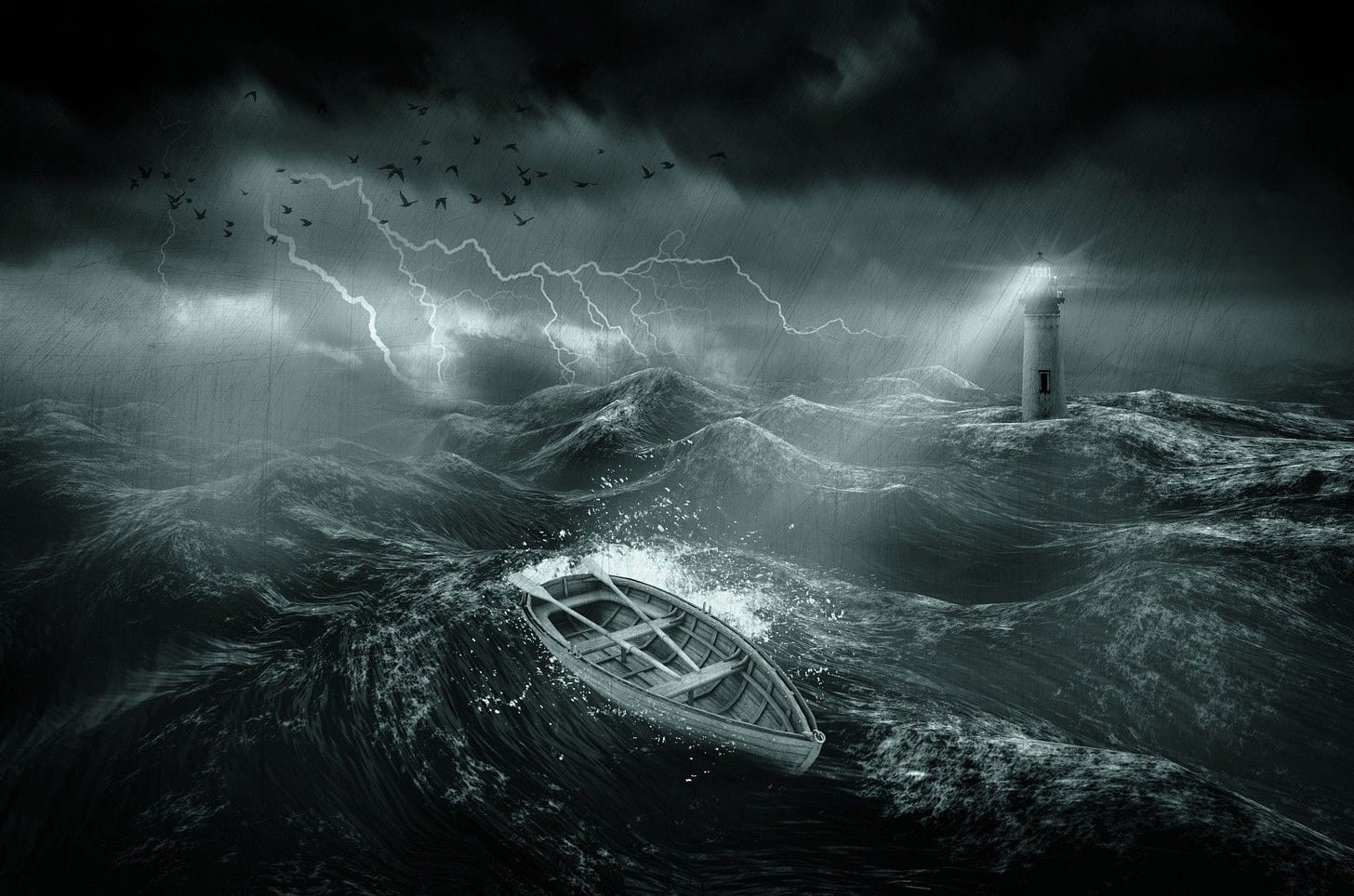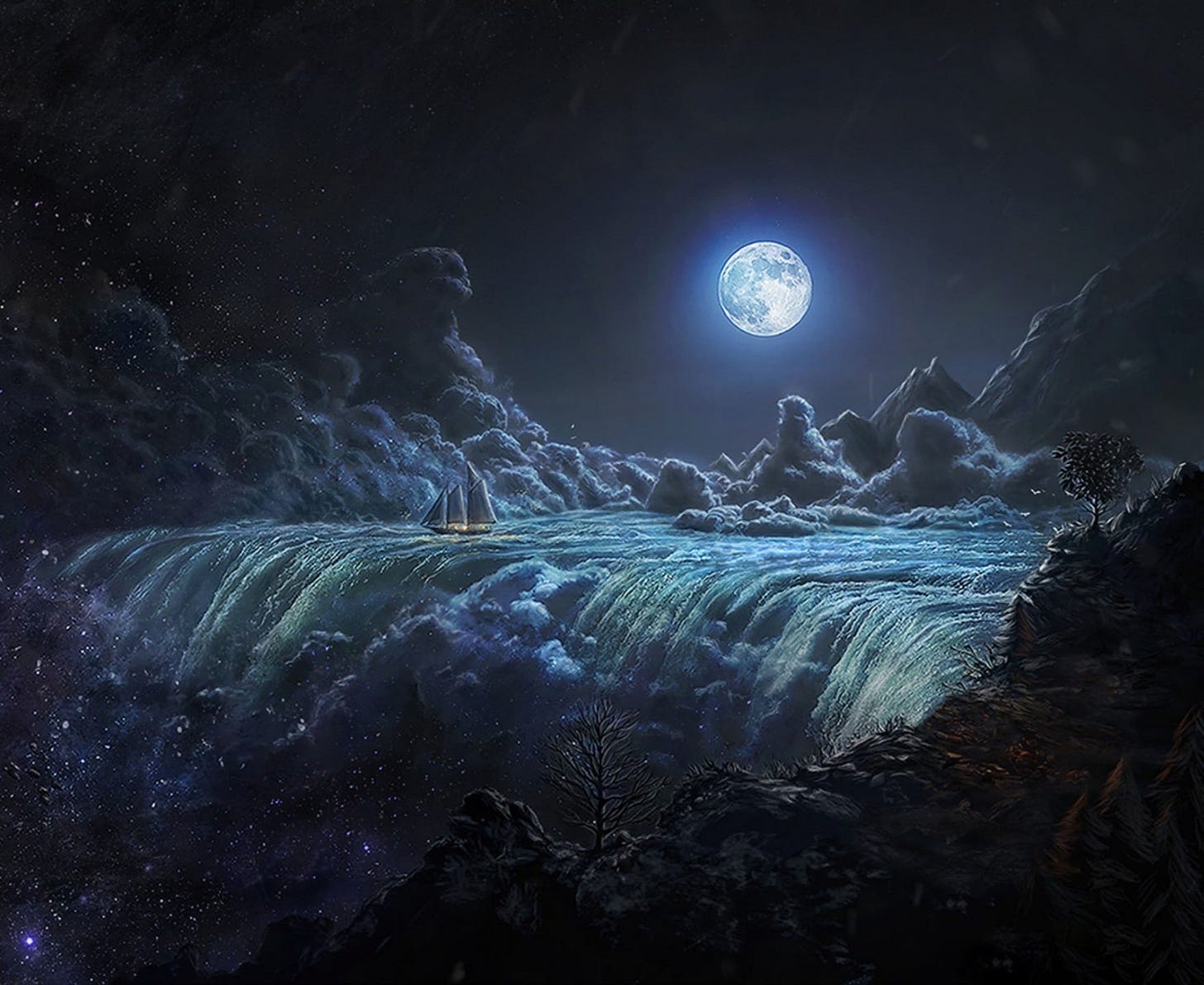REVIEW: When We Cease to Understand the World, by Benjamín Labatut
When We Cease to Understand the World, Benjamín Labatut (New York Review of Books, 2021).
Have you ever sat and stared at the sea? If you’ve been near it, then I’m sure you have. As soon as it hoves into view, our eyes are drawn up to that far horizon. Coast-dwelling cultures around the earth have stories and legends about the ocean’s strange magnetism. They tell of how that endless undulating plain is an eldritch vista that, once beheld, deepens and ages the soul. But stare too long, and you may never be able to tear your gaze away.
Robert Frost once described that hypnotic power in his poem Neither Out Far Nor In Deep:
The people along the sand All turn and look one way. They turn their back on the land. They look at the sea all day. As long as it takes to pass A ship keeps raising its hull; The wetter ground like glass Reflects a standing gull. The land may vary more; But wherever the truth may be--- The water comes ashore, And the people look at the sea. They cannot look out far. They cannot look in deep. But when was that ever a bar To any watch they keep?
Frost’s poem ends with a rhetorical question, but I think it gets things backwards. A great part of why the sea compels us to sit and stare is precisely that we cannot look out far, and we cannot look out deep. Standing on the shore you know, not just intellectually but deep in your bones, that the world we inhabit is but a soap bubble suspended over something unfathomable. The song you hear when you stare out into the waves, especially at night, is the call of the infinite abyss. True, this physical ocean isn’t really infinite, but the thing it signifies is. And for one lost in its vast, dark, featureless depths, it may as well be.
The title story of Benjamín Labatut’s new collection opens with the great quantum physicist Werner Heisenberg sitting on the remote island of Heligoland:
Looking at the waves scudding outwards and getting lost on the horizon, he could not help but recall the words of his mentor, the Danish physicist Niels Bohr, who had once told him that a part of eternity lies in reach of those capable of staring, unblinking, at the sea’s deranging expanses.
As far as I know, that conversation between Heisenberg and Bohr never happened, so is this book fiction then? Well, sort of, but it’s more informative than many nonfiction histories of twentieth century physics and mathematics. Like Schrödinger’s cat, the book exists in a quantum superposition of fiction and nonfiction. So does that mean it’s “historical fiction” of the sort clogging Amazon’s self-published section with juicy descriptions of Talleyrand’s love affairs, etc.? No, not quite that either, nor is it the literary equivalent of those historical documentaries that include dramatized reenactments. It’s something else.
Maybe the best way of understanding the genre that Labatut has created would be “tall tales,” or true stories that include exaggeration. I have…a friend, yeah, let’s say a friend, who occasionally embellishes the events he recounts. But I have it on good authority that he only does this to heighten the salience of particular points that he sees as the crux to understanding the episodes in question. An unkind listener might say that his stories are full of lies, but that’s unfair because those lies point towards a higher truth. Byzantine iconographers depict the faces of the blessed not as they were, but as they were supposed to be, as they would have been in a cosmos untainted by sin and death. In the same way, Labatut puts words in the mouths of his physicists that make the overall story of early twentieth century science as awesome and as comprehensible as it ought to be.1
And that’s good, because experiencing twentieth century physics and mathematics firsthand is one of the most sublime of all human experiences, but one sadly inaccessible to most human beings. It’s like staring into the sea, but one that truly is infinite, and without any stable vantage point. Imagine yourself surrounded by the black, endless ocean’s “deranging expanses,” but also strapped into one of those carnival rides where the floor drops away from you and you plummet down and down with an endlessly growing hole in your stomach. The feeling of one’s mind coming into contact with the beautiful yet bewildering design of the cosmos is like none other in the world, but unfortunately it takes years of work (plus some luck in the genetic lottery) to get a taste of it. So Labatut gives you the next best thing. He shows you how it destroys people.
To be clear, most of these people are somewhat cracked to begin with. “Mathematicians are all crazy” is a gross overgeneralization, but one with a significant basis in reality. The two most familiar examples to laypeople are Kurt Gödel, who starved himself to death because he would only eat food that was prepared by his wife; and Grigori Perelman, who rejected a million dollar prize for proving the Poincaré conjecture and later quit mathematics entirely with the remark, “I don't want to be on display like an animal in a zoo."
But ask a mathematician and they’re more likely to mention somebody like Alexandre Grothendieck. It’s hard to convey the sort of man Grothendieck was, but the ocean will help me. Edmund Wilson in his classic Things I Consider Overrated once complained that many people claim to love the sea, but nobody really does:
I believe that a genuine love for the sea is one of the rarest things in the world; it is a special and bizarre taste, very seldom acquired. Of course, everybody loves the sea as it appears from the shore: the effect of awful infinity, the dim ships in the distance and the breakers, like wild things from a jungle that come to heel on the shore and play with the children on the sand. Here the sea is romantic and beautiful because one does not have to see too much of it.
But what can be said for it in its absolute state, with no beach to civilize it?
It’s said that mathematicians love abstraction, but that’s like saying people love the sea, when what they really love is the view of it from the beach. For most people, getting better at mathematics is about building bridges from the concrete to the abstract, like setting out on ever more daring voyages into an infinite ocean. We ground our reasoning and our intuition in specific cases and examples of things, or in visual reasoning, or in something phenomenologically self-evident, and then we try to generalize and extend that reasoning — discarding the incidental features of it and keeping only the things that matter.
But the bridges remain bridges, and every sailing trip needs to end back at shore for rest and reprovision. The working mathematician keeps a toolbox of concrete examples on hand, and when faced with something truly mind-bending, he falls back on the comforting and familiar ground they represent. Not so for Grothendieck. For him, the bridges went in the other direction. His home was the ocean. Not the pleasant picture of it that we see from the shore, but the infinite maelstrom, the deranging, arid expanse. He was such a creature of that other world that it was reasoning over there that was natural and error-proof for him, while making a foray into the world of actual numbers was something he did only grudgingly.2
In the eternal war of the problem-solvers and the theory-builders, he was a theory-builder par excellence. But his theories were like nothing anybody had seen before. I’ve heard mathematicians describe them as inhuman. Nineteenth century mathematics was more advanced than eighteenth century mathematics, which in turn was more sophisticated than seventeenth century mathematics, but they were all still recognizably the same discipline and activity. If you brought a Newton or a Bernoulli centuries into the future to meet a Galois or a Gauss or a Klein, they would find the language and the concepts to be basically familiar. But bring any of them into the twentieth century, and they would be lost, and mostly for one reason: Grothendieck.
He came from that infinite ocean, and he carried it inside of himself, and he brought its influence to everything he touched. When Grothendieck deigned to solve actual concrete mathematical puzzles, his approach was maddening. Rather than attack the problem, he summoned the ocean, piled up abstractions upon abstractions, the black freezing waters pouring out of his emaciated body, the sea level rising and rising, until the problem, now barely visible at the bottom of an immense underwater canyon, would finally soften up and burst under its terrible pressure. The problem would be solved, but it would seem in hindsight insignificant, trivial even. Then Grothendieck would depart, leaving his collaborators awestruck, and with the task of exploring this new sea that had been summoned into being.
What does it do to a man to stare at the ocean for too long? Many of them lose their minds like Gödel, or become recluses like Perelman. Grothendieck did both, plunging first into sensual dissipation, then into the strictest asceticism. He travelled to Hanoi and taught lectures to the Vietcong by the light of American incendiary bombs,3 and then he walled himself up in his enormous, collapsing house to devote himself entirely to the interpretation of dreams. Finally he resigned his university positions, demanded that all his mathematical work be destroyed, and retreated to a remote village where he lived without running water and subsisted on boiled dandelions and gruel. But he could not flee the ocean, for he carried it inside himself, his blessing and his curse. One day he saw a group of children playing a simple game of line drawings, and he heard the roar of the waves. In that simple game he saw a vision for the future of mathematics, and out poured thousands and thousands of pages of manuscripts.
The same qualities that made Grothendieck one of the most important figures of the twentieth century also made him one of the most unknown.4 Labatut is here to fix that, with one of the stories in this collection entirely about Grothendieck and another similar character, his protégé Shinichi Mochizuki, inventor of “Inter-universal Teichmüller Theory.” But in this story the ocean drips with menace, the implication is that Grothendieck and Mochizuki have found something out there, perhaps something hungry. The real ocean teems with unseen life, why not the mathematical one too?5 This is an old trope. The alchemists believed that the correct symbolic manipulations and formulae could summon angelic or diabolical entities into our world, and it isn’t much of a stretch to start viewing the immaterial spaces accessed through mathematics as the dwelling-places of alien intelligence.
All this has the taste of cosmic horror to it, where ordinary life is revealed to be a kind of ontological cul-de-sac. Certainly many of the twentieth century scientists featured in this book felt that way about their work. Results like the uncertainty principle, the wave-particle duality, the various incompleteness and impossibility theorems, they all seemed to show that the part of the universe amenable to human intuition or even human understanding was but a thin film smeared over the surface of a vast and unruly sea. What made it worse was that the beginning of the century had been suffused with a giddy optimism that all the secrets of heaven and earth would soon reveal themselves to the intellect.6 Just as the truth about nature was about to be pinned down decisively, it had torn itself out of our grasp forever. Or maybe it was like the scene in a horror movie where, having made fast all the doors and windows of the house, the hero tears off his face to reveal that he was the monster all along.
What makes the cosmic horror of twentieth century mathematics and physics so particularly disorienting and nauseating is the way in which the irrational, unexpected, epistemic hopelessness is disclosed to us, step by step, via the most straightforward and logical means. People are wont to get all mystical about the uncertainty principle, but at its root, it’s just a pair of matrices that won’t commute. A fact of arithmetic, or at best algebra. Look, they’re right here, you can try multiplying them yourself! Similarly, so much of the seeming weirdness of quantum mechanics, the stuff that makes people feel like they need to appeal to metaphysical flimflam, all comes down to the fact that probability acts like a complex amplitude rather than a real number. And the original proof of Gödelian incompleteness feels anticlimactic almost the entire way, a lot of fiddling around with ways of encoding numbers and statements.
What all these examples have in common is a disjunction between mundane means of locomotion and fantastical destination. We expect the plodding, step-by-step application of formal reasoning to lead us somewhere reasonable. Occasionally it takes us up a hill, from which we have a beautiful view. But we do not expect it to lead us straight into Hell, or into the freezing depths of the ocean, or into the middle of the Sun. The experience of everyday life teaches us that your destination fits your means of travel. But the experience of doing early twentieth century mathematics or physics is that one minute you’re methodically picking your way up evenly-spaced steps, and the next minute shooting off into the abyss.
I still remember the day I first worked out the solution of Schrödinger’s wavefunction for a single particle trapped in a finite well of potential energy, and saw the little wisps of probability bleeding out the sides. I asked my teacher, “Did I get this wrong?” He answered, “No, that’s quantum tunneling.” I felt a lurch in my stomach, a terrible unease. We forget how magical it is that we can add two apples and two apples on a piece of paper, and the result is the same as what we get when doing it in reality. We forget that this is magic, because we got a reasonable result. We get a reasonable result, so it doesn’t alarm us that somehow the purely abstract world of numbers is commanding the apples, determining their exact number, like a deity speaking the world into existence in a creation myth. But nothing brings home the unreasonable effectiveness of mathematics in the natural sciences like having the math show you insane results, and then seeing that insanity spread out of the equations and into the world.
Labatut evokes this very particular form of horror perfectly in a story about Karl Schwarzschild. While serving as an artillery officer in World War One, Schwarzschild worked out the first ever exact solution to the Einstein field equations. His solution was what we conventionally refer to as a black hole, and he was not psychologically or spiritually prepared for it. Imagine him sitting there, working out a bit of tensor calculus in and amongst the shells loaded with chlorine gas, when suddenly he sees a monster staring back at him from the paper: an eternal, unchanging prison from which there is no escape, like an overwrought Thomist’s description of Hell.
The singularity spread across his mind like a stain, superimposed over the hellscape of the trenches; he saw it in the eyes of the dead horses buried in the muck, in the bullet wounds of his fellow soldiers, in the shadowy lenses of their hideous gas masks. His imagination had fallen prey to the pull of his discovery: with alarm, he realized that if his singularity were ever to exist, it would endure until the end of the universe. Its ideal conditions made it an eternal object that would neither grow nor diminish, but remain eternally as it was.7 Unlike all other things, it was immune to becoming and doubly inescapable: in the strange spatial geometry it generated, the singularity was located at both ends of time: once could flee from it into the remotest past or escape to the furthest future only to encounter it once more.
But of course there’s another form of horror here as well. The artillery shells filled with poison, the dead men piled in heaps, the landscape turned into the surface of the moon. The great discoveries of twentieth century physics not only were made during the years in which European civilization was annihilating itself, in many cases they were made by the men being annihilated.8 Most of the characters in this book are Germans, or Jews, or both; and the scientific action all takes place against a backdrop of gathering storm clouds. The world they live in is doomed, the disturbing portents are everywhere, but there’s nothing they can do. There is no swimming against the freezing, black current they’re caught in, all they can do is watch the world die.
If matter were prone to birthing monsters of this kind, Schwarzschild asked with a trembling voice, were there correlations with the human psyche? Could a sufficient concentration of human will — millions of people exploited for a single end with their minds compressed into the same psychic space — unleash something comparable to a singularity? Schwarzschild was convinced that such a thing was not only possible, but was actually taking place in the Fatherland… He babbled about a black sun dawning over the horizon, capable of engulfing the entire world, and he lamented that there was nothing we could do about it.
Would he have felt better if he had known that he and others like him would soon unlock energies that would make his poison gas attacks look like child’s play? It’s nothing short of miraculous that the twentieth century did not end in nuclear annihilation, and I’ve heard serious and sober-headed men chalk it up either to quantum many worlds or to divine intervention. But a simpler explanation is that our doom simply lies in the future. Inside a large black hole, matter can survive for millions of years before being torn apart by tidal forces or cooked by gamma ray flux. Who’s to say an entire civilization might not find itself within such an event horizon, circling and circling like a piece of flotsam caught in a whirlpool, wondering at how each year is a tiny bit shorter than the last.
[the] singularity sent forth no warnings. The point of no return — the limit past which one fell prey to its unforgiving pull — had no sign or demarcation. Whoever crossed it was beyond hope. Their destiny was set, as all possible trajectories led irrevocably to the singularity. And if such was the nature of that threshold, Schwarzschild asked, his eyes shot through with blood, how would we know if we had already crossed it?
I once had a dream in which I was lost in the sea. The cold surf would crash over my head and drag me down, but every now and again I would fight my way to the surface and see the twinkling stars above me. Then one by one, the stars were snuffed out and vanished, and I knew in my bones that at that same moment all the lights on land were going out as well, and that soon only the ocean would remain. Sometime in the last hundred years, did our civilization cross an event horizon of our own making? It’s impossible to know. Perhaps a million years hence our descendants will have spread through the universe, or perhaps it will all end tomorrow. Either way the ocean, the real ocean, eternal, unchanging, impassible, the ocean that all terrestrial oceans point to, it will still be there.
Hilaire Belloc once offered a different defense of tall-tales: “if you want to be believed in any matter worth believing, you had to bring an admixture of falsity into your statement. And the reason for this is plain enough. Either a truth is something that everybody knows about, and which, therefore, is not worth telling, or else it is something unusual, and therefore improbable, and likely to be disbelieved. It is the latter kind of truth which people ordinarily tell when they desire to interest their fellow-beings. But if they put that kind of truth straightforwardly, they are naturally taken for liars.”
One of the many, many things named after Grothendieck is the "Grothendieck Prime". It comes from a story like this:
Colleague: "Consider a prime."
Grothendieck: "Okay, got it, an element of the set of all primes."
C: "No, like a particular prime."
G: "Okay, a set containing exactly one particular prime."
C: "No, a specific prime. Which one are you thinking of?"
G: "Wait, you want me to name an actual prime number? Like a number number?"
C: "Yes, think of an actual, concrete prime number."
G: "Okay fine, I'm thinking of the number 57."
The joke is, of course, that 57 is not a prime number. There are other stories where students ask him to explain a simple concept and he (not ironically), does it in terms of a more difficult and abstract concept. These are not supposed to be funny "absent-minded professor" stories, these are terrifying stories about how he really saw the world.
A young woman who heard those forest lectures later obtained a math PhD by correspondence, launched the categorification of group theory, founded the first private university in Vietnam, and celebrated her 90th birthday last week.
He would not have minded this, he said he wanted to be "annihilated by history.”
Greg Egan has a lot of short stories on this theme. Wang’s Carpets was the only one I could find posted online, but the best one is Luminous, followed by its sequel Dark Integers.
It’s easy to forget that one of the problems on David Hilbert’s famous list was literally a mechanical procedure for resolving mathematical questions. In 1900 they were so optimistic, they thought there was soon going to be no math left to do!
Our current best guess is that Hawking radiation means black holes aren’t truly eternal, but since we lack an adequate theory of quantum gravity this is just a guess.
By this I don’t just mean the holocaust. Germany still exists today, but it’s hardly the world-bestriding colossus that it was at the turn of the century. German civilization once permeated Eastern and Southern Europe, and its influence was felt around the world. The really crazy thing about the Nazis is that they managed to pull off two genocides at once — the murder of the Jews, and the suicide of the Germans.







Another poem comes to mind:
Tell all the truth but tell it slant —
Success in Circuit lies
Too bright for our infirm Delight
The Truth's superb surprise
As Lightning to the Children eased
With explanation kind
The Truth must dazzle gradually
Or every man be blind —
(Emily Dickinson)
Succinct explanations give immediately useful answers, while multi-layered, tangential explanations give room for the mind to wander and experiment with new connections. Transfixation on the vastness of the sea feels like a infinity of the latter.
It's a wonder mathematics and science education doesn't include more stories about the men who figured things out. I'd started and put down Labatut's book months ago. Thank you for a reminder to pick it back up.